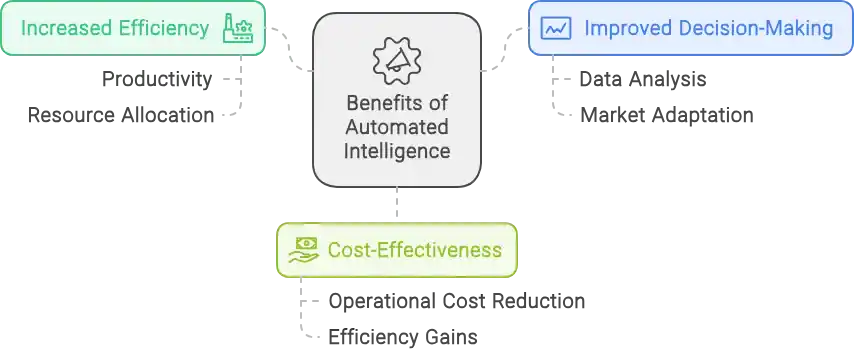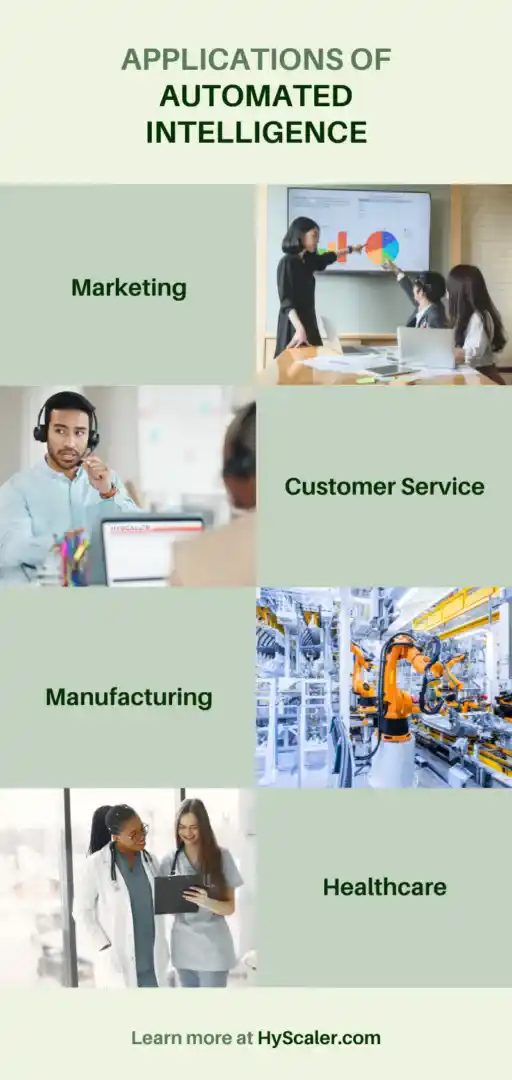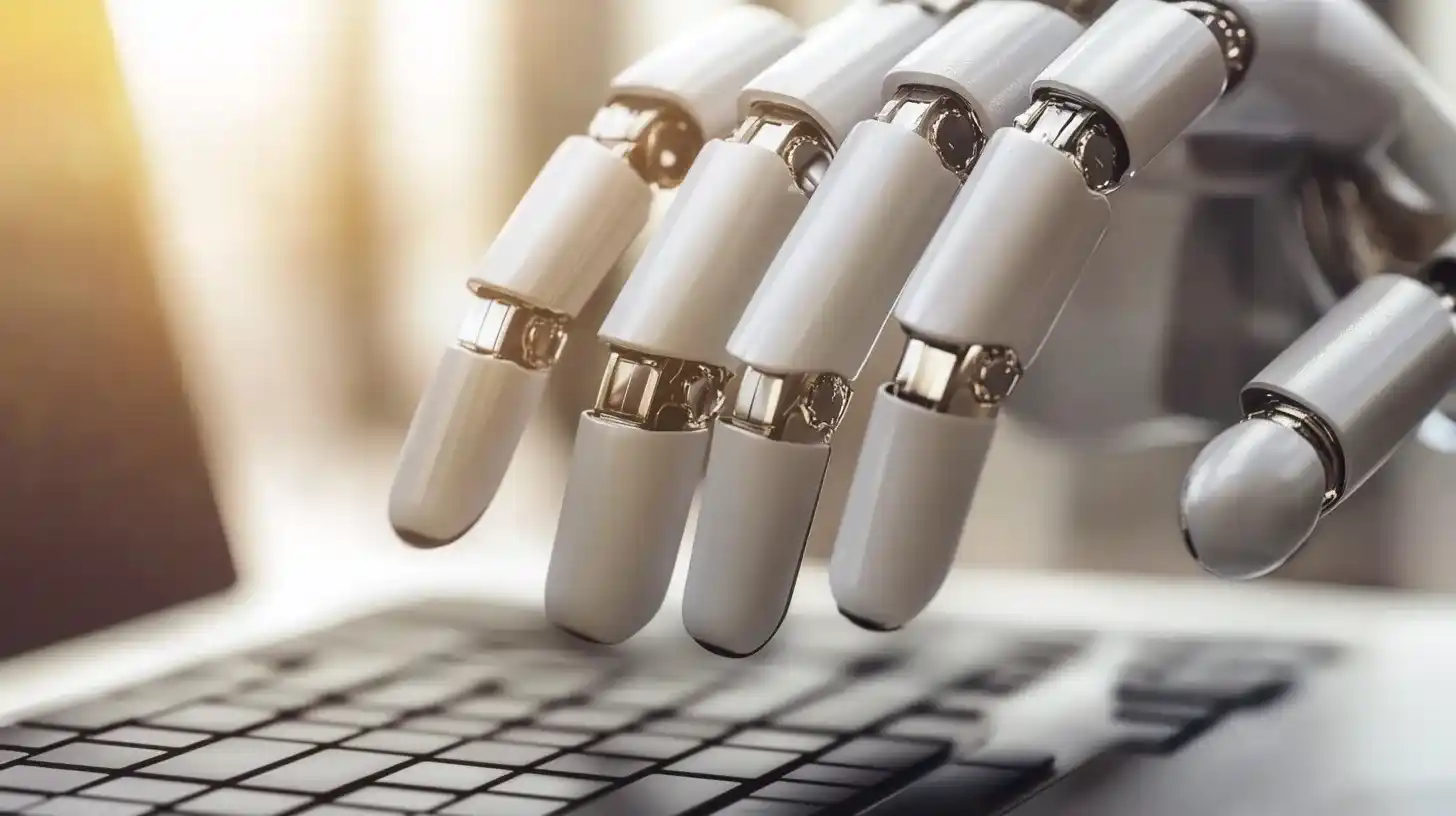Table of Contents
In today’s quick-moving digital scene, automated intelligence is becoming more popular as companies look to boost productivity and improve how they make decisions.
In this blog post, we’ll take a closer look at what automated intelligence means, see where it’s being used, and talk about how it can change the way businesses work.
What is Automated Intelligence?
Automated intelligence combines AI technologies to simplify decisions that humans use to make. It uses many AI methods, like machine learning and robotics, to carry out tasks on its own by looking at data and making smart choices without people stepping in.
As companies push for new ideas and ways to stay ahead automated intelligence shows up as a strong tool that makes work smoother, cuts down on mistakes, and speeds up decision-making.
By using these cutting-edge technologies, companies can boost their operations and find new ways to grow and succeed in a market that’s always changing. This change not only boosts how well things work but also pushes the limits of what machines can do in different fields.
How Automated Intelligence Matters in Today’s World
In a time of quick tech progress, automated intelligence plays a key role. It sparks new ideas helping companies to improve how they work and stay ahead in a fast-moving market.
Automating complex processes lets companies zero in on big-picture plans instead of routine work. This breeds an environment where new ideas and progress thrive.
What’s more, as customers want different things smart tech steps up to make their experiences better. This ensures businesses can meet or go beyond what people expect.
Benefits of Automated Intelligence

Increased Efficiency
Automated intelligence has a big influence on boosting productivity. When companies use machines to do routine jobs, they save time and money. This speeds up work and cuts down on mistakes people might make leading to better results.
This lets businesses use their resources in smarter ways putting more effort into coming up with new ideas and growing.
Improved Decision-Making
Automated intelligence helps companies make choices based on facts faster and more. These systems look at up-to-date information and spot patterns giving insights to guide big decisions. For example, e-commerce businesses can automate the collection of pricing data, product information, and customer reviews from competitor websites, enabling data-driven decisions about pricing strategies, product assortment, and market positioning.
This better way of making choices lets businesses adjust to market shifts, take advantage of new chances, and handle risks well. Additionally, RFP response automation can streamline the process of evaluating and responding to client inquiries, ensuring quick and accurate responses that align with the company’s strategy. Modern ai rfp software solutions take this automation further by leveraging natural language processing to analyze requirements, generate tailored responses, and maintain consistency across multiple proposal documents, significantly reducing turnaround times while improving response quality.
Cost-Effectiveness
The rollout of AI systems can help companies save a lot of money. Cutting down on manual work and making operations smoother lets businesses lower their costs while still getting a lot done.
What’s more, being able to make smart choices based on looking at data can lead to using resources better, which in the end boosts profits.
Applications of Automated Intelligence

Marketing
In the realm of marketing, automated intelligence is revolutionizing how businesses engage with consumers. By leveraging data analytics, companies can tailor their marketing strategies to target specific demographics, enhancing the effectiveness of campaigns.
Automated systems can also optimize ad placements and track consumer behavior, allowing for real-time adjustments that maximize return on investment.
Customer Service
Automated intelligence is transforming customer service by enabling businesses to provide instant support through chatbots and virtual assistants. These AI-driven tools can handle a multitude of inquiries simultaneously, ensuring that customers receive timely assistance.
This not only improves customer satisfaction but also frees up human agents to focus on more complex issues that require a personal touch.
Manufacturing
In manufacturing, automated intelligence enhances production processes by optimizing supply chain management and predictive maintenance. Smart machines equipped with AI can monitor performance metrics, predict failures, and adjust operations in real-time, leading to increased productivity and reduced downtime.
Healthcare
The healthcare sector is witnessing a profound impact from automated intelligence, particularly in diagnostics and patient care. AI algorithms can analyze medical data to identify patterns and assist in diagnosing conditions more accurately.
Additionally, automated systems can streamline administrative tasks, allowing healthcare professionals to devote more time to patient care.
Challenges of Automated Intelligence

Data Privacy Concerns
As automated intelligence systems rely heavily on data, concerns regarding data privacy and security are paramount. Organizations must navigate the complexities of data protection regulations while ensuring that sensitive information is safeguarded against breaches.
Potential Job Displacement
The rise of automated intelligence raises valid concerns about job displacement. As machines take over tasks traditionally performed by humans, there is a fear that certain job roles may become obsolete. Businesses must address these concerns by investing in workforce retraining and upskilling initiatives.
Ethical Considerations
The ethical implications of automated intelligence cannot be overlooked. As AI systems make decisions that impact individuals and society, questions arise regarding accountability, bias, and transparency. Organizations must establish ethical frameworks to guide the development and deployment of automated intelligence technologies.
Automated Intelligence vs Artificial Intelligence
While often used interchangeably, automated intelligence and artificial intelligence represent distinct concepts. Automated intelligence focuses on the application of AI technologies to automate decision-making processes, whereas artificial intelligence encompasses a broader spectrum of technologies aimed at mimicking human intelligence.
Understanding this distinction is essential for organizations seeking to leverage these technologies effectively.
| Feature | Automated Intelligence | Artificial Intelligence |
| Definition | Refers to systems that perform repetitive tasks through pre-defined rules set by humans. | Involves the replication of human intelligence in machines, enabling learning, reasoning, and decision-making. |
| Capabilities | Limited to executing specific, repetitive tasks without human-like thinking. | Capable of handling a broader range of tasks that typically require human intelligence, including learning from experience. |
| Learning Ability | Does not possess the ability to learn or adapt beyond its programmed instructions. | It has the ability to learn from data, recognize patterns, and enhance its performance over time. |
| Decision-Making | Follows pre-defined rules and instructions without the ability to make independent decisions. | Capable of making decisions based on data analysis and pattern recognition, allowing for adaptive responses. |
| Applications | Primarily used in environments where tasks are repetitive and predictable, such as data entry or simple process automation. | Utilized in diverse fields such as healthcare, finance, and customer service, where complex decision-making is required. |
| Integration | Often integrated into existing systems to enhance efficiency in specific tasks. | Can be integrated into various systems to create intelligent automation solutions that enhance overall productivity. |
| Examples | Robotic process automation (RPA) for data handling. | Machine learning algorithms for predictive analytics and natural language processing for chatbots. |
What is Intelligent Automation?
Intelligent automation is the convergence of traditional automation and artificial intelligence, resulting in systems capable of performing tasks with minimal human intervention.
This integration allows for greater adaptability and efficiency, as intelligent automation systems can learn from new data and experiences, continuously improving their performance.
What is Automated General Intelligence?
Automated general intelligence refers to a theoretical form of AI that possesses the ability to understand, learn, and apply knowledge across a wide range of tasks, much like a human.
While current AI systems excel in specific domains, the pursuit of automated general intelligence remains a significant challenge for researchers and technologists.
Future Outlook of Automated Intelligence
AI Technology Breakthroughs
The future of AI has an exciting outlook as the technology keeps growing. New concepts in machine learning, natural language processing, and robotics will boost what automated systems can do allowing them to handle tougher jobs.
AI Becoming Part of Daily Life
As AI shows up more often, it will change how people use technology in their everyday lives. From smart home gadgets to personal digital helpers, the smooth addition of AI into daily habits will make things easier and more effective.
How It Affects Different Fields
AI will shake things up in many industries changing how businesses work and operate. When companies start using these technologies, they’ll find new ways to grow, come up with fresh ideas, and make customers happier.
Conclusion
To sum up, automated intelligence has a huge impact on our world today bringing many perks like better productivity smarter choices, and lower costs.
We see it used in all sorts of fields, from marketing to healthcare, but it also brings up issues about keeping data safe, people losing jobs, and doing the right thing.
As we deal with a world that’s getting more and more automated, we need to see how automated intelligence can lead to new ideas and boost productivity.
If companies responsibly use these technologies, they can set themselves up to do well in a future where automated intelligence plays a key part in shaping how business and society work.
FAQs
1. What is the main difference between Automated Intelligence and Artificial Intelligence?
- Automated Intelligence focuses on performing repetitive tasks through pre-defined rules set by humans. It does not learn or adapt beyond these instructions.
- Artificial Intelligence, on the other hand, aims to mimic human intelligence, allowing machines to learn from data and make decisions based on that learning.
2. Can Automated Intelligence learn from experience?
No, Automated Intelligence does not possess the ability to learn or adapt. It strictly follows the rules and instructions provided by humans.
3. In what scenarios is Automated Intelligence typically used?
Automated Intelligence is primarily used in environments where tasks are repetitive and predictable, such as data entry, simple process automation, and other manual tasks that require minimal human intervention.
4. What are some applications of Artificial Intelligence?
Artificial Intelligence is utilized in various fields, including healthcare for diagnostics, finance for fraud detection, and customer service through chatbots that can understand and respond to human queries.
5. How does the integration of AI enhance automation?
The integration of AI with automation creates intelligent automation solutions that enhance productivity by allowing systems to adapt and respond to new data, improving efficiency and decision-making capabilities.
6. What ethical considerations should be taken into account with Automated Intelligence?
Ethical considerations include privacy, transparency, job displacement, algorithmic bias, and the societal impact of deploying automated systems. Organizations must navigate these concerns to ensure responsible use of technology.
7. What are the advantages of using Automated Intelligence?
Some advantages include performing tasks faster and more accurately than humans, reducing errors, and allowing human workers to focus on more critical and creative tasks.